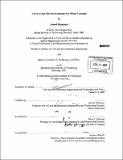| dc.contributor.advisor | John R. Williams. | en_US |
| dc.contributor.author | Rajagopal, Anand, 1979- | en_US |
| dc.contributor.other | Massachusetts Institute of Technology. Technology and Policy Program. | en_US |
| dc.date.accessioned | 2006-03-24T18:29:34Z | |
| dc.date.available | 2006-03-24T18:29:34Z | |
| dc.date.copyright | 2005 | en_US |
| dc.date.issued | 2005 | en_US |
| dc.identifier.uri | http://hdl.handle.net/1721.1/30200 | |
| dc.description | Thesis (S.M.)--Massachusetts Institute of Technology, Dept. of Civil and Environmental Engineering; and, (S.M.)--Massachusetts Institute of Technology, Engineering Systems Division, Technology and Policy Program, 2005. | en_US |
| dc.description | Includes bibliographical references (p. 76-78). | en_US |
| dc.description.abstract | In today's society, there is a need for organizations to have a robust knowledge infrastructure in place, so that they can create or acquire knowledge; store knowledge; disseminate knowledge, and protect and manage their knowledge assets. However, with advances in the publishing media, our ability to generate information has far exceeded our abilities to find, review and understand it, thus leading to "Information Overload". Information overload refers to the inability to extract needed knowledge from existing information due to the volume of information, or lack of understanding of information and its whereabouts, or efficient ways to locate relevant information. These issues could be addressed by having efficient Knowledge Management Systems/Knowledge Services, so that people can create and understand available information, and have services to help them learn effectively and make better decisions. To tackle the new information needs, the use of technologies such as Weblog Services (weblog-enabled knowledge services) offer opportunities for decentralized knowledge creation and dissemination; as such tools put the authors in charge of knowledge creation process without any administration-enforced policies. Learning environments are also typically characterized by challenges such as barriers to use, quality control and relevance issues, or issues of credibility of information. These issues are effectively tackled by weblog services since weblogs are often open source and need no training for authoring. In addition, favorite blogs act as information filters or "bird dogs" and point at useful information. Feedback incorporated in weblog services makes people react and learn "interactively" and also enhances credibility and trust in information. | en_US |
| dc.description.abstract | (cont.) Weblog services can also share published content through the process of Content Syndication, and thus offer an insight into knowledge assets in the timeliest of ways. This thesis report describes certain weblog services implementations carried out at MIT. Results of such implementations have emphasized the applications of such weblog (knowledge) services in knowledge sharing and online learning. However, there are certain issues to be addressed in weblog services such as privacy and intellectual property issues, as well as resolution of organizational tussles in the domain of content syndication standards. | en_US |
| dc.description.statementofresponsibility | by Anand Rajagopal. | en_US |
| dc.format.extent | 79 p. | en_US |
| dc.format.extent | 5081019 bytes | |
| dc.format.extent | 5089453 bytes | |
| dc.format.mimetype | application/pdf | |
| dc.format.mimetype | application/pdf | |
| dc.language.iso | eng | en_US |
| dc.publisher | Massachusetts Institute of Technology | en_US |
| dc.rights | M.I.T. theses are protected by copyright. They may be viewed from this source for any purpose, but reproduction or distribution in any format is prohibited without written permission. See provided URL for inquiries about permission. | en_US |
| dc.rights.uri | http://dspace.mit.edu/handle/1721.1/7582 | |
| dc.subject | Civil and Environmental Engineering. | en_US |
| dc.subject | Technology and Policy Program. | en_US |
| dc.title | A knowledge services roadmay for online learning | en_US |
| dc.type | Thesis | en_US |
| dc.description.degree | S.M. | en_US |
| dc.contributor.department | Massachusetts Institute of Technology. Department of Civil and Environmental Engineering | |
| dc.contributor.department | Massachusetts Institute of Technology. Engineering Systems Division | |
| dc.contributor.department | Technology and Policy Program | |
| dc.identifier.oclc | 60688837 | en_US |
